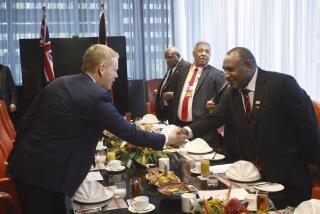Shultz Scolds New Zealand on Nuclear Ban : Says It ‘Walked Off the Job’ of Defending Common Security
- Share via
HONOLULU — Secretary of State George P. Shultz, in his most direct attack yet on New Zealand, accused that country Wednesday of weakening regional stability and increasing the risk of war by denying port access to U.S. nuclear warships.
“New Zealand walked off the job, the job of working with each other to defend our common security,” he said at the East-West Center at the University of Hawaii here in what aides billed as a major speech on alliance responsibilities.
Shultz was on the final leg of a 20,000-mile swing through Southeast Asia, Australia and the South Pacific, where the growing threat of Soviet penetration and the crippled nature of the tripartite ANZUS alliance--Australia, New Zealand and the United States--were major preoccupations.
But he broadened his address to cover all U.S. alliances and appealed for allied support on a variety of controversial U.S. policies, including those on the Strategic Defense Initiative (“Star Wars”), Nicaragua and terrorism.
Terrorism Affects All
International cooperation is necessary to deter and raise the costs of terrorism and those who support or hide terrorists, Shultz said. “No nation can afford to define its interests so narrowly as to imagine it is not affected.”
In a question-and-answer session after his address, Shultz emphasized the value of airport security checks. In the last two decades, he said, such measures at U.S. airports have led to the confiscation of 35,000 pistols and explosive charges and to 13,000 arrests.
The confrontation with New Zealand began a year ago, when the newly elected Labor government adopted a policy of refusing permission for port visits to any nuclear-powered or nuclear-armed ships. In February, a conventionally powered U.S. destroyer was scheduled to call there in connection with routine military exercises with the New Zealand navy. But in line with longstanding policy, Washington refused to confirm or deny the presence of nuclear weapons on board its ships, and the destroyer was barred from entering port.
U.S. Canceled Exercises
The United States, in response, canceled all joint military exercises with New Zealand and now withholds intelligence data it previously had shared with that country.
But the U.S. Navy, which has said it cannot carry out its responsibilities for defense of the region without access to the ports of that ally, would like the Administration to exert additional pressure on New Zealand.
Adm. Sylvester R. Foley, commander of the U.S. Pacific Fleet, said in an interview here that he has recommended withdrawal of landing rights for New Zealand’s ships and planes in Honolulu and at other facilities en route to Canada and other destinations.
State Department officials, on the other hand, view the “nuclear allergy” behind New Zealand’s move as a global phenomenon. They contend that pressuring New Zealand to return to full participation in the 34-year-old alliance now will not solve and might only aggravate the larger problem. They prefer to work for a change in public opinion in New Zealand and elsewhere.
Shultz apparently chose the higher road in his address by appealing not only to the current government of Prime Minister David Lange but also to the people of New Zealand to recognize their shared responsibility in the alliance.
He noted that other U.S. allies also have special policies regarding nuclear weapons, but none bar U.S. ship visits.
“If New Zealand’s objective was to enhance Pacific security and reduce the nuclear danger, it has acted against its own interests,” he said. “By adding a new element of risk and uncertainty, New Zealand has weakened regional stability, one of the most important links in the effort to prevent nuclear war.
“And the erosion of Western unity only weakens the Western position and the chances for success in arms control,” he said.
The United States has “left the door open,” he continued. “New Zealand remains a friend.” He said he hopes that current differences will be overcome and that New Zealand will take no further actions to exacerbate differences, such as enacting a pending proposal binding future New Zealand governments to the same nuclear policy.
In Wellington, Lange said Wednesday that he will consult U.S. officials before introducing legislation to formalize his government’s ban on nuclear-powered and nuclear-armed warships in New Zealand ports. Such legislation “must be seen to be in no sense anti-American and we have to be sensitive to that,” Lange said.
But the New Zealand leader showed no sign of backing down on such a bill, saying that it “might precipitate a review of the (ANZUS) treaty” and that a “redefined treaty” might be “a very useful thing.”
More to Read
Sign up for Essential California
The most important California stories and recommendations in your inbox every morning.
You may occasionally receive promotional content from the Los Angeles Times.













